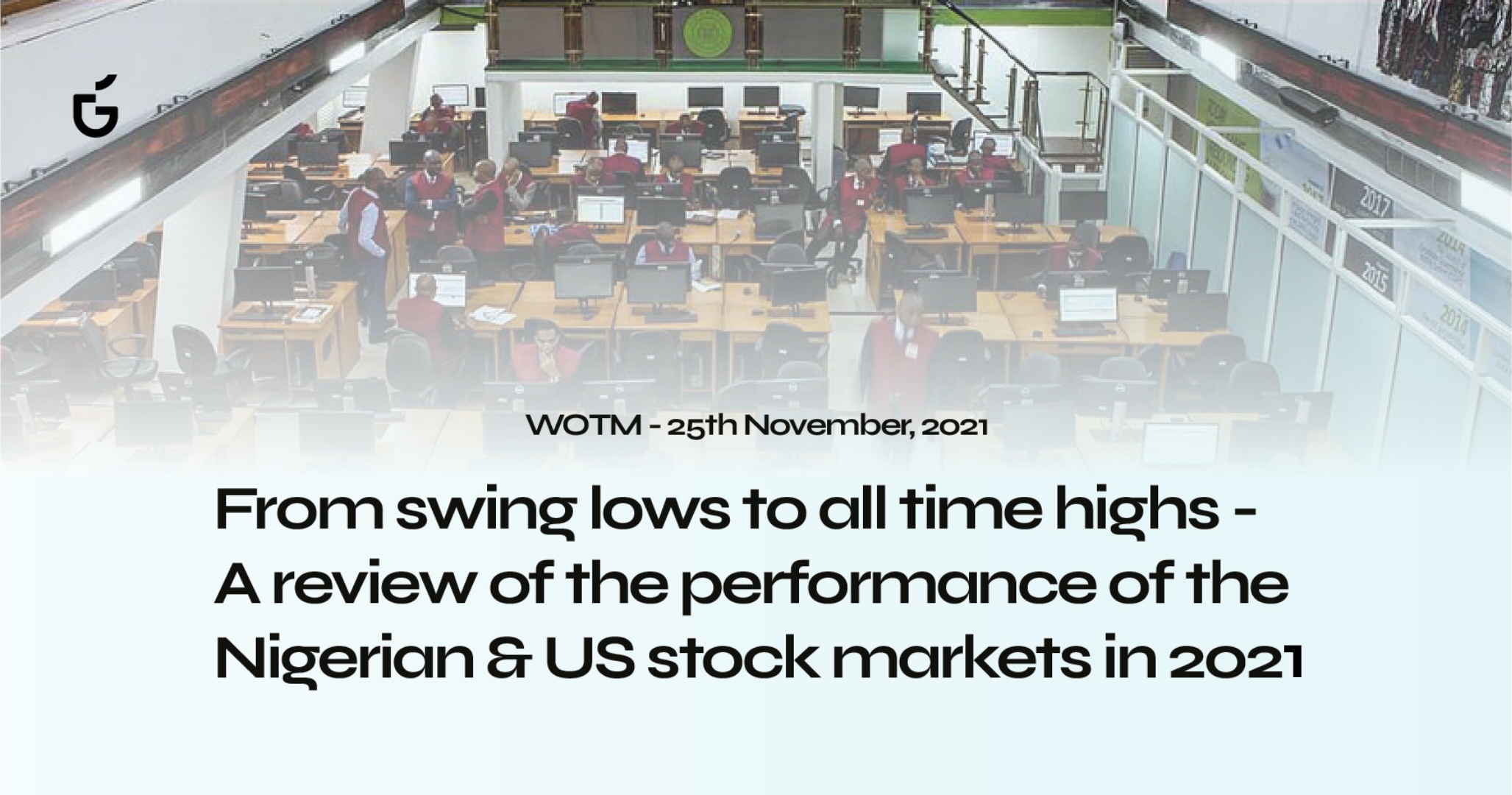 Africa
AfricaUnderstanding how companies are valued – A look into the MainOne acquisition
15 December, 2021
25 August, 2021 | 4 MINS READ
The Story
After a long wait, the Petroleum Industry Bill (PIB) was passed into law on Monday, the 12th of August 2021. The Petroleum Industry Act provides the legal, regulatory, and fiscal framework for the Nigerian Petroleum Industry, the development of host communities & related matters.
Also in the past week, the Central Bank of Nigeria (CBN) obtained a court injunction to freeze the accounts of 6 online investment apps in Nigeria. The accounts have been frozen to allow the CBN carry out investigations on how these companies source their foreign exchange.
What is the Petroleum Industry Act?
The Petroleum Industry Act is an act enacted to provide the modus operandum for the Nigerian petroleum industry. The new law will provide the legal, regulatory, and fiscal framework for the operation of the different aspects of the petroleum industry. The petroleum industry is the cash cow of the Nigerian economy. The industry accounts for 90% of the country’s foreign exchange revenue and 60% of total income. The industry has however been plagued by a myriad of challenges including opaqueness in the operations of the Nigerian National Petroleum Corporation (NNPC), moribund refineries, environmental pollution, gross corruption amongst other things.
The new petroleum industry law is to clean up all these and restructure the industry for success going forward. Some of the things to be instituted by the law include the unbundling of the NNPC, which implies decentralizing the operations of the oil corporation and breaking it up into smaller segments. Also, shares of the NNPC will be sold; it will become commercially oriented, and profit-driven. The most controversial aspect of the new law is the revenue allocation quota for the different oil-producing regions in the country.
The law stipulates 3% revenue allocation to the host communities in the Niger Delta (Southern part of Nigeria) despite a push for 10%, while 30% was allocated to a fund for the exploration of oil in frontier basins (mostly Northern states).
What Happens to the Pump Price of Petrol with the New Law?
A major reform that comes with the new petroleum industry act is the deregulation of the downstream oil sector. Deregulation simply means the removal of government restrictions from the pricing of petroleum products. Presently, the government with its petroleum subsidy determines the pump price of petrol, putting a cap on how much players in the downstream segment of the Nigerian petroleum sector can earn from the sale of petrol.
The new law, if fully implemented will allow for the pump price of petrol to be market-determined and be more reflective of economic realities. The Petroleum Products Pricing Regulatory Agency (PPPRA) has however stated that “the current price will remain until negotiations with organized labor, which will develop a feasible framework that minimizes the impact of Market-Based pricing policy on the masses, is concluded.’’ This implies the pump price of petrol will still be determined by the government.
As the world moves away from fossil fuel to the use of cleaner energy, the passage of the PIB might be a little late. Environmental, Social & Governance (ESG) is now at the core of corporate ethics. International Oil Companies (IOCs) are presently transiting to clean energy. Royal Dutch Shell (the IOC accounting for 40% of Nigeria’s crude and condensate production) recently announced its plan to exit the Nigeria oil industry. Shell expressly stated that its Nigerian onshore business is incompatible with its long-term strategy of climate change and net-zero carbon emissions by 2050. Chevron and Mobil have also tolled the same lane.
Nigerian Trading Apps & the CBN
Attention was drawn to 6 online trading apps (Bamboo Systems Technology Ltd, Trove Technologies Ltd, Risevest Technologies Ltd, Chaka Technologies Ltd, CTL/Business Expense, and Bamboo Systems Tech Ltd OPNS) after the CBN with a court injunction demanded the bank accounts of these online trading apps be frozen for 180 days. The fintech companies have been accused of using foreign exchange sourced locally to fund the purchase of foreign shares and bonds. They’ve also been accused of operating as asset management companies when they do not have the license to do so.
How Do these Fintechs Operate?
These fintech companies through their apps give retail investors the opportunity to invest in foreign financial assets like shares, bonds, and real estate. Investors are allowed to pay Naira into their accounts on the apps, the Naira is converted to dollars to enable users to buy the financial assets they want to invest in. Their activities put them under the purview of the Securities and Exchange Commission (SEC), and before now SEC had hinted it’s working on instituting regulations that will guide the operation of fintech companies in Nigeria.
How Does the CBN Come into this?
The Central Bank of Nigeria is responsible for controlling the foreign exchange market in Nigeria, hence, activities related to the use of foreign exchange in Nigeria are of concern to the Apex bank.
While it looks like the CBN is pulling every string to effectively manage the foreign exchange reserve in the face of dwindling FX revenue, the use of locally sourced FX to purchase foreign investment instruments like shares and bonds contravenes the rules of the CBN.
The Central Bank has a list of 41 items that are not allowed to source FX from the official FX market. The purchase of foreign shares and bonds is number 41 on this list. It is however not clear where fintech companies source their FX.
At the announcement of the ban of BDCs a couple of weeks ago, the CBN Governor noted that it would come after all agencies and companies facilitating the sale of dollars in the parallel market as their activities were dollarizing the economy. The freezing of accounts of these fintech companies we believe is a follow-up to that announcement.
Is Regulation Stifling Innovation in Nigeria?
Typically, innovation will always be ahead of regulation. Innovators will innovate and regulators will create rules and regulations to protect the interest of users of such innovations. As much as the regulation is necessary, it is important that it is not done in a way that discourages growth and investment in innovation. Nigerian regulators are infamous for coming hard on businesses, their activities heighten the harshness of the business environment, discouraging new entrants into the economy.
In recent times, we’ve seen regulators in China clamp down on the activities of technology companies in China. This has moved venture capital funds from China to other Asian countries like India.
Innovators looking to operate in highly regulated sectors like finance should ideally approach the regulator before kickstarting operations to ensure they will be operating within the right legal framework. But the regulatory bottlenecks in Nigeria don’t encourage this.
Bringing it all together, how do all these affect me as an investor?
The deregulation of the downstream oil sector has a direct impact on investor’s funds. Seeing that Nigeria is still highly dependent on the importation of refined petroleum products, market-determined pricing of petroleum products will automatically lead to a rise in the pump price of oil in Nigeria whenever oil prices rise in the international market. This has inflationary implications. Adding another layer of price increase to already high inflation shrinks the real return on investment.
The government however seem reluctant to let go existing subsidy given its socialist stance. This also comes at a cost, as the maintenance of a subsidy the government cannot afford increases government debt. Rising fiscal debt in the face of declining revenue will lead to stiffer fiscal policies like higher taxes and a rise in regulatory fines in a drive to raise revenue. Higher debt will also raise the interest rate on financial securities.
Investors who have investment accounts with any of these fintech companies that have their accounts frozen by CBN need not worried as most of their funds are invested in financial instruments. The companies have come out to assure their users of the liquidity of their assets. These fintech companies are sub-brokers who give retail investors access to the market through full-fledged brokers. Investor’s assets are held with the brokers, not the sub-brokers, so investors’ funds are safe and can be accessed at liquidation or maturity of financial assets.
We’ll however advice that investors watch to see how events in the coming weeks and months will play out before deciding on depositing funds in their investment accounts with these fintechs.
 Africa
Africa15 December, 2021
 Africa
Africa09 December, 2021
Join the biggest
investment club in Nigeria.